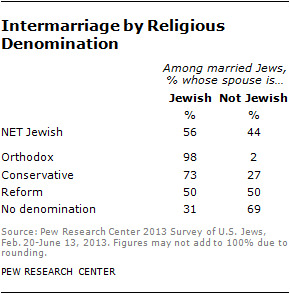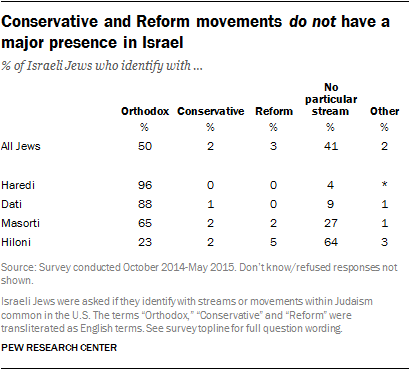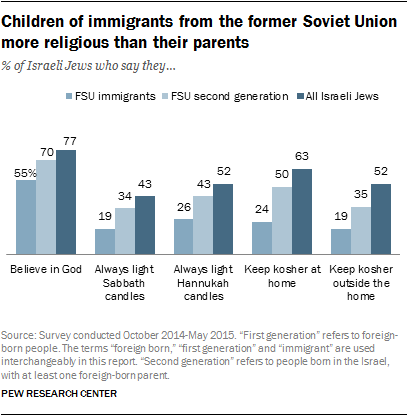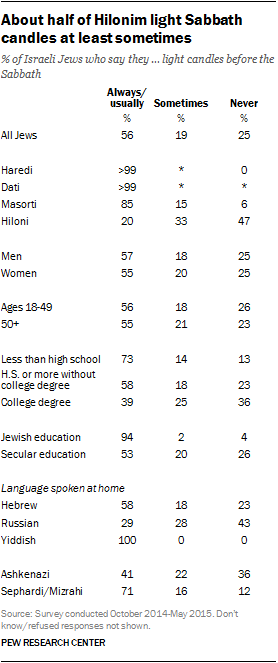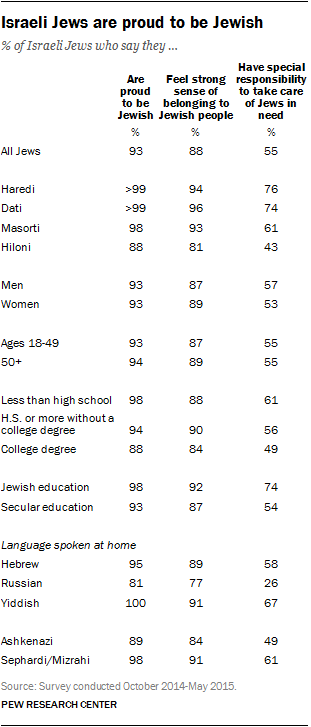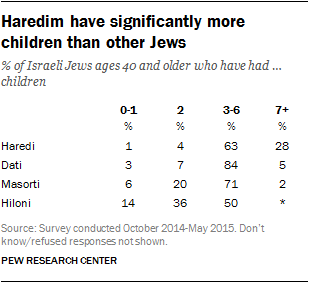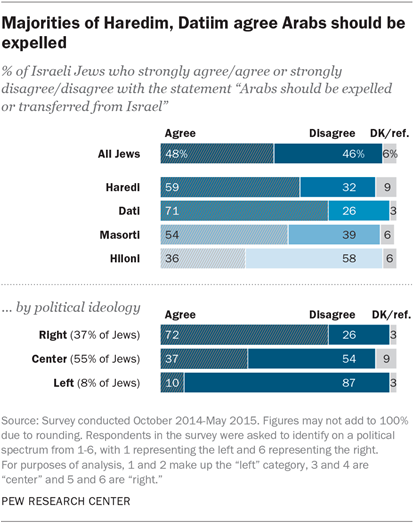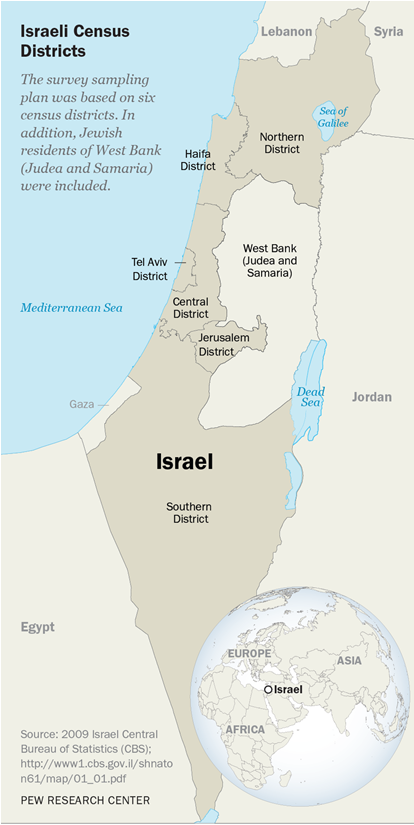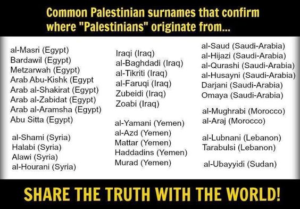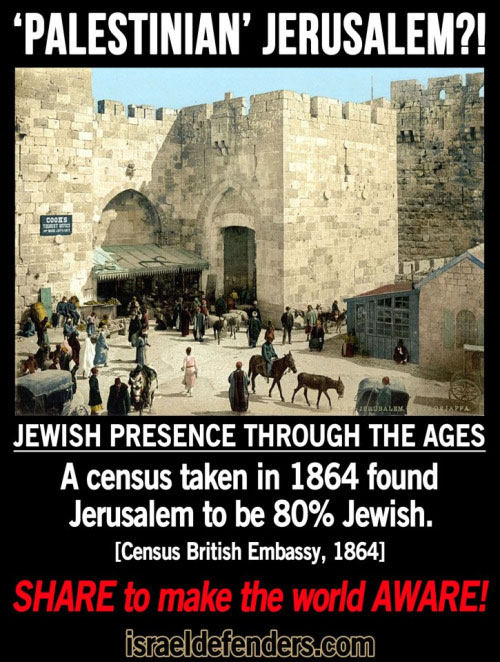It’s time to come home! Nefesh B’Nefesh: Live the Dream 1-866-4-ALIYAH UK 0800 075 7200 Come home to the Land of Emuna Nefesh B’Nefesh: Live the Dream US & CAN 1-866-4-ALIYAH | UK 020-8150-6690 or 0800-085-2105 | Israel 02-659-5800 https://www.nbn.org.il/ info@nbn.org.il By Mr. Whiskers 09March2016 ג באדר ב׳ ה׳תשע״ו
But to try and place Israelis into a Diaspora box is all wrong. We have a different history then from the German Jews of the 1800s and their descendent that immigrated to the US in the 1880s -1920s from Europe. What Jews in America are not taking into account is all the Sephardic Jews from North Africa/Middle East that were not influenced by European History of the 1800s. Then there is the Baal Teshuva Movement of Jews returning to Hashem (G-d), when they realize there is more to life then the latest things. American and Israeli Jews: Twin Portraits From Pew Research Center SurveysJews in Israel generally place themselves into one of four informal categories of Jewish religious identity. These labels – Haredi (ultra-Orthodox), Dati (religious), Masorti (traditional) and Hiloni (secular) – are not connected to formal Jewish organizations or denominations, but instead are loose identity groups (similar, for example, to an American Christian calling herself an “evangelical” rather than a “Southern Baptist”). Something to look at:Thoughts on the Conversion mess
If you classify American Jews as the Israelis do then the majority are Hiloni and not Reform. They just go for the social events. They care more about Football then the sermon.
Rebbetzin Esther Jungreis – Johannesburg, South Africa, in 1999. |
|
Conversation with Rabbi Zevulun Leiberman Z’l 200408April2016 https://shilohmusings.blogspot.com/2016/04/guest-post-rabbi-zevulun-leiberman.html
To quote Vic Rosenthal on March 10, 2016
Two peoples divided by a common religion (Vic Rosenthal)
Comment: Your average Reform or Conservative member would be classified in Israel as secular hilonim and have nothing to do with the non-Torah movements. |
|
In America, about half of married non-Orthodox Jews have a non-Jewish spouse.The unaffiliated American Jew is usually the assimilated Jew with no knowledge of Jewish texts or identification with Jewish traditions. And Reform Judaism has separated itself from Orthodoxy and even Conservative Judaism so much – both in practice and in philosophy (think of the Reform concept of tikkun olam as social action) – that those who insist that it is more like a different religion than a kind of Judaism have a cogent argument …. 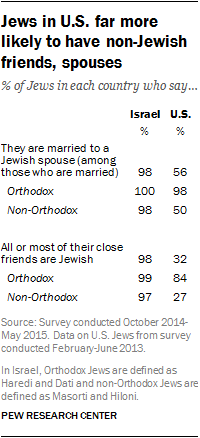 intermarriage in the US vs. Israel If you want a Jewish spouse and have your children marry Jewish spouses make Aliyah
|
|
Non-Torah movements are 1% – 2%? That is a statistically close to ZERO. No Israeli Wants You because you are all talk and no action sitting in your easy chair in America. Except for the non-religious High Court who hate the Haredim and the Politicians that are concerned with getting Money and keeping the “Diaspora Happy”, the Reform and other non Torah “streams” are nothing in Israel.
If you really care about Israel – MAKE ALIYAH!!!! If you want Reform here, Move Here. Stop Crying and Whining and Do Something worthwhile, Make Aliyah Today and live your life in Israel. |
![Gemara Megillah 6B Germanya,[Germany] a royal province of Edom; who, if they would but go forth, would destroy the entire world.](http://www.jerusalemcats.com/wp-content/uploads/2022/03/Megillah-6B-Germanya.jpg) Gemara Megillah 6B Germanya,[Germany] a royal province of Edom; who, if they would but go forth, would destroy the entire world. A Purim Warning to American JewsThe Gemara is incredible, it have everything in it. Such as: |
|
Horrific Poway Chabad House ShootingApril 29, 2019 Chabad of Poway, California, |
|
Caroline Glick The American Jewish Community’s Moment to ChooseFrom Pew Research Center http://www.pewforum.org/2016/03/08/jewish-beliefs-and-practices/ Comparing religious observance among Jews from the former Soviet Union and their childrenRemember the Jews were forced into a Communist Anti-religious life where if you were praying you would find yourself in a Soviet Labor Camp or Dead. remember the experience of Natan Statanski the Soviet Refusenik who wanted to make Aliyah.
First- and second-generation immigrants from the former Soviet Union (FSU) make up roughly one-fifth of Jewish respondents in the Pew Research Center survey; 14% are immigrants and 5% are children of at least one immigrant parent. Overall, Jews who immigrated to Israel from the former Soviet Union are less religious than Israeli Jews as a whole. But the survey also finds that second-generation FSU Israelis are considerably more religiously observant than their parents’ generation. When it comes to Jewish subgroups, for example, 60% of those in the second generation say they are Hiloni, compared with 81% of first-generation immigrants. While 4% of first-generation immigrants say they are Haredi, among the second generation, this proportion has climbed to 14%. Children of FSU immigrants also are much more likely than their parents to believe in God (70% vs. 55%). On this question, second-generation FSU immigrants are closer to Israeli Jews overall, 77% of whom say they believe in God. Similarly, when it comes to Jewish religious practices such as lighting Sabbath candles, keeping kosher, holding or attending a traditional Seder and studying the Torah, children of FSU immigrants are considerably more active than the first generation. For example, children of FSU immigrants are about twice as likely as their parents to keep kosher, both in their home (50% vs. 24%) and outside their home (35% vs. 19%). And while about four-in-ten first-generation immigrants from the former Soviet Union (42%) say they eat pork, only 17% of second-generation FSU immigrants say they personally do so. |
|
Israeli Jews more observant than U.S. JewsShare of Jews who are Orthodox is twice as large in Israel as in the U.S.Although they share the same religion, Israeli Jews and U.S. Jews often do not practice Judaism the same way. Israeli Jews themselves range from very religious to secular, but they are, on average, more religiously observant than American Jews. One driver of the religiosity gap between Israeli Jews and U.S. Jews is the fact that Orthodox Jews make up about one-in-five Jews in Israel (22%) but only one-in-ten Jewish adults in the United States (10%). In both countries, Orthodox Jews tend to be far more religiously observant than other Jews. Israeli Jews more likely than U.S. Jews to observe Jewish rituals and practicesIsraeli Jews are more observant than U.S. Jews. Overall, Israeli Jews display more religious involvement than U.S. Jews on several measures. Roughly a quarter (27%) say they attend religious services at least weekly, more than double the share of American Jews who say the same (11%). Israeli Jews also are somewhat more likely than U.S. Jews to say religion is very important in their lives (30% vs. 26%), and considerably more likely to say they believe in God with absolute certainty (50% vs. 34%) and that they believe God gave Israel to the Jewish people (61% vs. 40%). Additionally, Jews in Israel report more frequent participation in specific Jewish practices than do Jews in the U.S. For example, 56% of Israeli Jews say someone in their home always or usually lights Sabbath candles on Friday night, compared with 23% of U.S. Jews who say the same. Roughly six-in-ten Jews in Israel (63%) say they keep kosher in their home, nearly three times the share of American Jews who do this (22%). Israeli Jews also are more likely than U.S. Jews to say they hosted or attended a Seder for Passover (93% vs. 70%) and fasted all day on Yom Kippur (60% vs. 40%) in the last year. Comment: In Israel the Holiday Shopping starts at lest 30 Day before the Holiday. The Store Ads and Specials are for all the Holidays, not just the major holidays like Rosh Hashana and Pesach (Passover). Holidays like Chanukah, Shavuot, Purim, Tu B’Shevat, and Lag B’Omer along with other holidays like Yom HaAtzmaut, and Yom Yerushalayim are celebrated with great joy and happiness. There is the weekly reminder of being Jewish every week with Shabbat, both shopping and cooking for Shabbat and Shabbat itself. Do you have that in the States? |
|
|
|
Jewish Pride, Connectedness and Responsibility in AmericaIn the United States, younger Jews express lower levels of emotional attachment to Israel than do older Jews. Among Jews in Israel, however, the new survey finds few, if any, significant differences by age in attitudes toward U.S. Jews.
The American Jewish community is more distant from Israel than in past generations because it is changing, is in significant ways growing weaker, and is less inclined and indeed less able to feel and express solidarity with other Jews here and abroad. |
|
If you want to be a Proud Jew, Move here. Move to Israel and Make Aliyah Today.It’s time to come home! Nefesh B’Nefesh: Live the Dream 1-866-4-ALIYAH UK 0800 075 7200 Come home to the Land of Emuna Nefesh B’Nefesh: Live the Dream US & CAN 1-866-4-ALIYAH | UK 020-8150-6690 or 0800-085-2105 | Israel 02-659-5800 https://www.nbn.org.il/ info@nbn.org.il Alyah : mode d’emploi http://www.jewishagency.org/fr/aliyah/program/7618 Choisissez celle qui vous correspond et inscrivez-vous sur notre site Internet en cliquant ICI ou par téléphone, en appelant le Global Center au 0800 916 647 |
|
In Israel Jews feel pride, connectedness and responsibility in Jewish communityAcross different age groups and educational, ethnic and religious backgrounds, the vast majority of Jews in Israel agree that they are proud to be Jewish and have a strong sense of belonging to the Jewish people. And more than half of Jews in Israel (55%) say they have a special responsibility to take care of Jews in need around the world. Examples of Israeli Pride helping the worldWar veterans suffering post-traumatic stress in the US; farmers in Senegal, India and China; young women in South Sudan; the wheelchair-bound in Africa; cardiac patients in Gaza and Iraq – all have received life-changing help and expertise from Israeli specialists. Today we all know the story of Israel the startup nation. News of its technological prowess and incredible innovation has spread far and wide. But what many people don’t know is that Israel is exporting far more than just technology. It is also sharing its experience and skills in a whole range of humanitarian and environmental fields to help people everywhere live better, fuller and healthier lives. Since Israel was founded in 1948, the country has set itself the goal of becoming a light unto the nations. In the early years of the state, despite austerity rationing, the Israeli government founded MASHAV, the Israeli Ministry of Foreign Affairs’ Center for International Cooperation, as a vehicle to share Israel’s creative solutions with the rest of the developing world. Israel remains true to that vision and every year, with little fanfare, and sometimes very little press attention, Israelis work long hours to find solutions and offer relief to some of the most pressing problems of our times. From environmental breakthroughs that will help reduce greenhouse emissions, to technologies that can increase food production and save vital crops, to humanitarian aid missions in the wake of catastrophic natural disasters, Israelis are providing significant assistance. 84% of Israelis agreed with the sentence, “Diaspora Jews and Israeli Jews share a destiny, even though they live in different countries.”Yoni Kempinski, 18/12/16 http://www.israelnationalnews.com/News/News.aspx/221887 A new study done in honor of the Week of Connection to Diaspora Jewry shows how deep the connection between Israel’s Jews and Diaspora Jews really is. 84% of Israeli Jews agreed Judaism (not including Torah observance) meant being part of a larger group of people who share roots and history, and 80% felt Diaspora Jews were their brothers. |
Israel’s Population Bomb is Disappearing:by Elliott Abrams November 16, 2016 https://www.cfr.org/blog/israels-population-bomb-disappearing
|
|

The Haredim total fertility rate is 6.9 vs. 2.1 for Hiloni and US Reform of 1.4Haredim to surpass Arab population by 2050David Rosenberg, 11/08/16 http://www.israelnationalnews.com/News/News.aspx/216254 The birthrate among traditional Jews has increased marginally over the past decade, rising from 2.2 in 2005 to 2.6 in 2014. Among traditional-religious Jews the rate is slightly higher, rising from 2.6 in 2005 to 3.0 in 2014. For non-haredi religious Jews, the TFR has remained stable at 4.2. But with a TFR of 6.9, the haredi population’s growth rate is more than double the total Jewish TFR of 3.1 and even the Arab TFR of 3.3.
|
|
Ashkenazi, Mizrahi or Sephardi? Jewish ethnic identity in IsraelIsraeli Jews are nearly evenly split between two Jewish ethnic identity groups – the Ashkenazim (45%) and the Sephardim or Mizrahim (48%). These two ethnic groups retain some distinct religious practices and cultural traditions associated with their ancestral roots. The chief rabbinate in Israel consists of two rabbis – one who is Ashkenazi and the other Sephardi. The Ashkenazim (from the Hebrew term for Germany, Ashkenaz) trace their roots mainly to central and eastern Europe. (Indeed, a quarter of Israeli Ashkenazim say they speak primarily Russian at home.) Sephardim and Mizhrahim vary widely in their ancestral origin – from Spain’s Iberian Peninsula to the Middle East and Central Asia. Mizrahi (from Mizrah, meaning eastern in Hebrew) often is used interchangeably with Sephardi (or Sfaradit, meaning Spanish in Hebrew). Sephardim and Mizrahim have similar religious traditions and practices, distinct from those of the Ashkenazim. Sephardim typically trace their roots to ancestors who lived in Spain until they were expelled during the Spanish Inquisition. The Sephardim then migrated eastward and lived largely among the Mizrahim in the Middle East and North Africa. Sephardi and Mizrahi Jews are, on average, more religiously observant than their Ashkenazi counterparts. Fully two-thirds of Ashkenazim identify as secular (Hiloni) Jews, compared with about three-in-ten of Sephardim/Mizrahim (32%). A plurality of Sephardim/Mizrahim (42%) identify as Masortim. Over the course of Israel’s modern history, the Sephardi/Mizrahi community has experienced problems with discrimination and marginalization.16 This survey finds, however, that a majority of Sephardi/Mizrahi Jews say there is not currently a lot of discrimination against Mizrahim in Israeli society (32% say there is a lot, 64% say there is not). However, it should be noted that Sephardim/Mizrahim are significantly more likely than Ashkenazim to say that Mizrahim face a lot of discrimination (32% vs. 9%). Overall, the survey finds Ashkenazim in Israel are more likely than Sephardim/Mizrahim to give priority to their Israeli identity over their Jewish identity. Fully 42% of Ashkenazim say they are Israeli first and Jewish second, compared with 27% of Sephardim/Mizrahim who say this. While Ashkenazim are closely divided among those who say they are Israeli first and those who say they are Jewish first, among Sephardim/Mizrahim, the prevailing view is that they are Jewish first (53%). |
|
Aliyah: Immigration to IsraelAliyah, meaning ascent in Hebrew, is a term commonly used to describe Jewish immigration to Israel. From the late 1800s until 1939, there were five major waves of immigration to the land that would later become the State of Israel. These waves had distinct ethnic, socioeconomic and historical characteristics, from the largely Russian and Romanian wave that formed the first aliyah (1882-1903) to the fifth aliyah – also known as the German Aliyah – which took place in the period leading up to World War II (1929-1939).23 ). Immigrants to Israel prior to the establishment of the State of Israel were collectively known as the yishuv, or settlement. Although the naming of aliyah cohorts largely ended in 1939, the use of the word aliyah to describe Jewish immigration to the land of Israel continued. There have been several points in Israel’s modern history when waves of immigrants arrived from particular countries or regions. For example, between 1949 and 1950, in what came to be known as kanfey nesharim, or Operation On Eagles’ Wings, the State of Israel airlifted nearly 50,000 Yemeni Jews to Israel. Similarly, the State of Israel conducted two airlifts in Ethiopia – Operation Moses in the mid-1980s and Operation Solomon in 1991. (The survey did not include enough interviews with either Yemeni Jews or Ethiopian Jews to analyze those groups separately.) A large wave of immigration from the former Soviet Union began in 1989. In the early 1990s, nearly 800,000 immigrants arrived in Israel from the former Soviet Union (FSU).24 ). In this survey, about three-quarters of Jewish respondents from the former Soviet Union made aliyah between 1990 and 1999. An additional 15% of FSU Jews say they made aliyah from 2000 to 2014, while a similar share (12%) say they made aliyah prior to 1990. Most immigrants from the former Soviet Union (73%) say they continue to primarily speak Russian at home. For more information about immigration from the former Soviet Union, see this sidebar in chapter 5 |
|
Who is included in the survey?The survey includes interviews with citizens and residents living within the boundaries of Israel, as defined in the 2008 census conducted by Israel’s Central Bureau of Statistics. Jews were surveyed in all six census districts (Jerusalem, North, Haifa, Center, Tel Aviv and South) and in the West Bank. How religious groups are definedThe 2015 Pew Research Center survey of Israel includes interviews with 3,789 Jews, 871 Muslims, 468 Christians and 439 Druze. An additional 34 respondents belong to other religions or are religiously unaffiliated. |
|
The Mitzvah to Live in Eretz Yisrael
|
|
|
|
|
Yossi Klein Halevi |
|

Thoughts on the Conversion messR. Haskel Lookstein’s conversions, Ivanka Trump’s halakhic status, demands by “Open Orthodox” rabbis for Israel to recognize their private decentralized conversions, wildcat actions of outlier rabbis – and the unity of the Jewish People. Rabbi Prof. Dov Fischer, 13July2016 http://www.israelnationalnews.com/Articles/Article.aspx/19186 Several years ago, I was invited to participate as the Orthodox rabbi on a three-rabbi panel with one of the most prominent and deeply respected Reform rabbis in Southern California and with a counterpart Conservative rabbi who also commands substantial respect and prestige. The topic was the Orthodox rabbinate’s predominant role in Israel on matters of conversion to Judaism, and the venue was Valley Beth Shalom, the predominant Conservative/Reconstructionist temple in the San Fernando Valley of Los Angeles.
I was warned politely by the people who invited me that the congregation would be coming to “eat me alive” and that two other Orthodox rabbis had been invited before me but respectfully had declined. I accepted eagerly. Although at the time I still had never joined a Board of Rabbis, my poskim (rabbinic decisors) permitted such engagements where the opportunity arose to speak with, meet, listen to, engage, and educate other Jews, and to expose them to Shomer Shabbat (normative Orthodox Sabbath observant) rabbis and personalities. The debate’s format began with each of us serially presenting an initial ten-minute overview of our respective perspectives on conversion. Then there would be questions from a moderator. And, finally, questions from the floor. The Reform rabbi began. He explained how he does conversions, his views that a conversion must come from the heart and need not include mikvah or circumcision, and he generally berated “the Orthodox” but in a very dignified manner. The Conservative rabbi followed and presented his views, expectations, and requirements, and he also expressed great dismay over the Orthodox rabbinate’s control in Israel. Both rabbis echoed a common theme: “Who are these rabbis in Israel to say that our conversions are not valid?” It next was my turn. I began by turning to the Conservative rabbi and asked him: “You just heard [Reform] Rabbi [X] say that he does conversions that often do not include mikvah or circumcision for men. I just heard you say that, by contrast, you do require those rites as part of conversion. Therefore, I am wondering: If someone comes to your temple and asks to be counted in your minyan, telling you that he has been converted to Judaism by our esteemed Reform colleague and good mutual friend, but without a circumcision or mikvah, would you recognize that conversion?” The Conservative rabbi did not even pause before answering. Knowing his ethics, I was not surprised when he responded straightforwardly: “No, I could not accept such a conversion.” That was my presentation that night. The rest of the evening was spent listening to the Reform rabbi challenging the Conservative rabbi for refusing to recognize his conversions, the Conservative rabbi explaining his standards and why he could not accept those conversions, and me eating the cookies on the dais. Most of the questions from the moderator and the audience continued on that theme. I was younger then, and I may have eaten all the cookies while they battled. The American Mess The conversion situation in America is out of control, with thousands of non-Jews presenting conversion documents from Reform and Conservative — and also some profoundly unscrupulous Orthodox-denominated — rabbis, who have “converted” them in processes that have no halakhic bases whatsoever. The Reform rabbis are acting in the best of good faith and deep honor. They truly believe they are acting correctly. Same with the Conservative rabbis. They expend great effort to teach. It is serious for them, no joke. They have real curricula, reading lists, standards, and expectations. However, for others who truly believe in halakhic requirements for conversion, those standards are not met in most, if not all, cases. There also are unscrupulous rabbis denominated as Orthodox who run specious wildcat “conversion factories.” Their standards border on the bogus, and their fees trample the conscience. Armed with ordination and unable to find income at a synagogue pulpit, yeshiva or day school faculty, community or outreach organization, or kosher-certifying agency, they ply their trade among a clientele including the most innocently unsuspecting and the most cynically cognizant. I think back to the case of the Israeli professional basketball team, bridled by their league rule limiting the amount of foreigners whom league teams can import for their squads. The league did not want Israeli basketball simply to be a haven for NBA rejects. So the team arranged for an American non-Jew to be insta-converted by an American Orthodox rabbi and then to have that character gain Israeli citizenship under the Law of Return. Now an “Israeli,” he could be on the team without counting against the foreigner quota. It worked like a charm until the guy found out that, as a full-fledged Israeli, he now had to fight in Tzahal, the Israeli armed forces. A decade later, he was convicted in America of conspiracy to import heroin, importation of heroin, and possession of heroin with intent to distribute and was sentenced to ten years prison. Kiddush! In yesteryear, not everyone was getting intermarried and converted. Times have changed. Today, more than fifty percent of American Jews “marry out.” For many of those intermarrying, there is Jewish parental pressure on the non-Jewish spouse to convert. To the degree that the non-Jewish spouse is not intensely wedded to any religion anyway, the sense is: “Sure, OK, if it makes your parents happy. I don’t want you being written out of your parents’ wills.” Thus, a conversion is pursued. Where the couple are not driven by any particular halakhic motivation but instead are impelled by parental pressure or a sense that they both should associate with the same system for the kids whom they will bear or have borne, the much-easier step is a non-halakhic conversion. Many fewer demands, much speedier timetable — although much more expensive. And so it goes . . . in the thousands. Consider America’s immigration laws. Let’s leave all the Democrat-Republican politics out of it, all the rhetoric about “sanctuary cities” and “building walls” and “anchor babies” and “dreamers,” and let’s just focus on Title 8 of the United States Code. For all the political tension over immigration, we rarely if ever read or hear of a federal judge making up her own laws of immigration and granting United States citizenship to people who have not complied with the federal statutory requirements. Imagine the utter chaos if judges in one state followed one set of immigration statutes while those of other states each followed their own rules. America does not work that way. We all follow Title 8. If someone is granted citizenship in California, that status is good for all fifty states. Moreover — again leaving out politics — all federal judges swear an oath of fealty to the same Constitution and to adhere to its laws. Therefore, although individual judges may differ as thinking human beings, there is a sense that everyone, regardless of agenda, is playing on the same field with the same ground rules. Jewish conversion should work that way, too. It needs to work that way. Otherwise, we truly lose our peoplehood. Taking all politics aside, if an Orthodox Jew by definition truly believes in halakha, then she needs to marry a Jew. And if a man has converted to Judaism in a manner outside the halakhic framework, conducted by a judicial panel — a Bet Din — who are not committed to the Halakha Constitution and to all its statutory requirements, then that Jewish woman cannot marry that converted fellow because he simply is not halakhically Jewish. When the situation affects an outlier person here or there, the matter can be managed privately and sensitively. However, once the society reaches a point where thousands of such converts are presenting as “full Jews,” chaos ensues for those non-political individuals trying to adhere to halakhah. “You tell me you are Jewish, and you believe you are Jewish, and I eagerly want to believe you are Jewish, and half a century ago the odds were that you probably are Jewish — but today it is chaos.” What with the non-Jewish children of unconverted non-Jewish moms presenting as “patrilineal Jews” because they have a Jewish Dad who promised to rear them as Jews, and with converts who did not go to a mikvah or never accepted the Divinity of the Oral and Written Torah or never accepted the personal undertaking of the halakhic lifestyle — or whatever — it is utter chaos. And there are mighty ramifications. May an halakhic Jew marry someone who believes he is Jewish but is not? May a patrilineal be counted in an Orthodox minyan? Given a Torah aliyah? May a person converted outside the rubric of halakhah be so denominated? It is a mess. It is such a mess that applicants to yeshiva day schools now are asked respectfully to provide grandparents’ identifications because once a child enters a yeshiva and gets a diploma after twelve years of yeshiva, many would assume without asking that the person is an halakhic Jew. We desperately are endeavoring to avoid so severe a schism that we truly become two separate peoples, unable to marry. Thus, all Jews are Jews — Reform Jews, Conservative Jews, Reconstructionist Jews, agnostic and atheist Jews — but non-Jews are not Jews. Whose Conversion Is This — the Convert’s or the Rabbi’s? Until 2006, I did as did virtually all my Orthodox colleagues among shul (synagogue) rabbis. When approached for conversion, I taught, mentored, and eventually helped the prospective Ger (convert) reach the moment of Giyur (conversion). At that point, I gathered two rabbinical colleagues, and we supervised the mikvah and, for men, circumcision (or hatafat dam) requirement. Our converts all were taught halakhic requirements, and we did not conclude the process until we were as certain as three humans can be that the prospective Ger thenceforth would live an halakhically observant life. That decentralized system worked well for the local shul rabbi, but it increasingly left the prospective Ger exposed. In an era of completely chaotic American conversions, the Ger’s proof that her conversion was halakhically kosher was the certificate presented by the local shul rabbi and his two colleagues. If the rabbi was known and respected, that worked fine. But what if the rabbi were not known outside his hamlet? In an era of conversion chaos, what if a Ger would present papers in another city or state where the converting Bet Din was unknown? Typically, the rabbi in the new location would call the rabbi who had conducted the conversion and confirm his halakhic fealty in a brief phone call or noting where he was practicing. It would not be sufficient merely to check that the converting rabbi was a member of one or another Orthodox rabbinical association, although that would help. But what if the rabbis on the certificate could not be found? What if they had passed away? What if they had passed away thirty years earlier? Fifty years earlier? How check them? Indeed, what if the shuls where they had been rabbi no longer existed? Or what if the shuls had changed halakhic practice over time? Chaos. And if that chaos is bemusing within the United States, imagine an Israeli rabbinate trying to figure out who the rabbi in America was, what his halakhic standards were. In 2006, recognizing the growing problem that the conversion chaos in America was causing and the need for a more formally structured procedure to help the Israeli Chief Rabbinate ferret more efficiently to determine with maximal certainty the kashrut of respective people’s halakhic conversions in America years earlier, the Rabbinical Council of America and the Israeli Chief Rabbinate entered into a formal agreement known as the Geirus Policies and Standards Network (GPS). See, e.g., http://www.judaismconversion.org/ Under that system, anyone who wishes to convert to Judaism according to halakhah after 2006 can do so with a rabbi who is registered with and who works in tandem with a Bet Din recognized as part of the RCA’s GPS network. For example, on the West Coast the GPS Bet Din is the Rabbinical Council of California. All conversions I have sponsored since the day that GPS began are sponsored under the RCA’s GPS rubric. I mentor and sponsor converts, but I do not “sign off” on conversions. This new GPS system has taken away some of my authority and my formerly decentralized power to direct the tempo of the conversion process. I now serve more as the local shul rabbi supervising and teaching, but I voluntarily have ceded some of my “power and authority” by agreeing to conform to the GPS system. How does it feel for me to be presented with this limitation on my authority? Frankly, I am satisfied that my feelings utterly do not matter. My “power and authority” in this area do not matter. The Giyur (conversion) is not about me; it is about the Ger. Now, the person who converts halakhically under my sponsorship does not have to worry about whether the Chief Rabbinate has heard of rabbi Dov Fischer of California. They do not worry whether their great grandchildren will have to document who the converting rabbi was a century earlier. Rather, they have the peace of knowing that the conversion carries the rubric of the Rabbinical Council of California, a participating GPS Bet Din. The conversion is about them, not me. Dealing with Pre-2006 / Wildcats / Independents Even as the RCA and Chief Rabbinate coordinated to solve a central aspect of the conversion problem to assure greater equanimity for Gerim who convert as of 2006, they also addressed the matter of kosher conversions that pre-dated the launching of GPS. When someone who converted halakhically before 2006 seeks to have that decentralized kosher conversion recognized and accepted in Israel today, the person applies to the Rabbinical Council of America’s Bet Din of America (BDA) for a certification of the past conversion’s kashrut. The RCA’s BDA then conducts a proper and comparatively efficient investigation by contacting the sponsoring rabbi at the time, asking predictable questions, and confirming that the conversion was done k’das u-k’din. When that rabbi is not available — perhaps he even is not alive anymore — the BDA investigates in other manners, contacting those who knew that rabbi, determining that rabbi’s bonafides from his career, considering where he got his semikha (ordination), where he was a shtella (synagogue) rabbi if he had shul positions, and other considerations. As it happens, I have on my desk in my office right now the formal documentation that I recently received from the RCA’s BDA after a successful Giyur-confirming investigation that I asked BDA to launch on behalf of one of my congregants who underwent an halakhic conversion decades and decades ago. I contacted Rabbi Michoel Zylberman at BDA, provided him with the documentation and information he requested of me, and BDA confirmed the conversion’s kashrut. I also now have in my inbox a communication from another rabbi elsewhere who has a family claiming in his neighborhood that I was their Gerut rabbi a few decades ago. He is checking with me, and we will get a BDA certification for that one, too. I am not at all offended. It is not about me. It is about a uniform system for everyone so that halakhic Gerim can have peace of mind hereinafter for their future generations. Now here is the thing. Even in this Age of the RCA-BDA GPS system with the Israeli Chief Rabbinate, I still am free to bypass GPS and to do as I did thirty years ago, conducting my own conversions and convening my own Bet Din with two colleagues. However, I choose not to do so because I cannot guarantee any American Ger in the year 2016 the kind of long-term peace of mind if I act independently that she would have if converted via GPS. If the certifying document merely bears my name and that of two colleagues, then the Ger is back to asking the Chief Rabbinate to check me out again. By contrast, when the conversion is through GPS, then uniform standards undoubtedly have been met. I could vie to have my name be included on a special list of rabbis who independently are recognized by the Israeli Chief Rabbinate. However, like almost all of my colleagues, I have no desire to do so. I want for people who approach me to know they are being converted under the stronger institutional imprimatur. For that same reason, I advise any person who is seeking conversion or considering conversion or who knows someone doing so to ask any individual rabbi or rabbi who presents as head of his own conversion Bet Din: “Please provide me with a formal written guarantee that any conversion I do under your sponsorship will be accepted by the Israeli Chief Rabbinate now and in the future.” I give such a guarantee to the GPS Gerim whom I sponsor. It is, to me, a matter of transparency and best practices, just as medical providers provide full disclosures in advance of procedures. It would not be surprising that a conversion pursued with any rabbi or rabbi who will not provide such a written guarantee may raise red flags. The recent matter regarding a long-ago conversion conducted by rabbi Haskel Lookstein, for which the Israeli Chief Rabbinate requested more documentation, generated great media attention because, years later, he also was associated with the halakhic conversion of Ivanka Trump. The media had a field day as they do whenever they tackle any subject dealing with Jews, and they misrepresented facts as they often do because, as a White House advisor recently stated, the media are comprised of many inexperienced journalists unschooled in the finer points of certain subjects they are covering and lacking the time to do the research before an impending deadline. As facts actually have it, Ms. Trump was converted under the GPS rubric. There is no question regarding her conversion. She was converted with the full institutional imprimatur. By contrast, Rabbi Lookstein’s earlier conversions that pre-dated the GPS can be subject to the same pro forma confirmation process that I would expect would be applied to those who converted on my watch. We have one basic standard that should treat all of us equally. And it must never be about us. Rabbi Dov Fischer, Esq., who has served two three-year terms on the Executive Committee of the Rabbinical Council of America during the past seven years, is an adjunct professor of the law of Torts and of Civil Procedure at two major Southern California law schools and is rabbi of Young Israel of Orange County, California. His views on this and other subjects are his own and can be found at www.rabbidov.com [Comment: Bottom line to the Reform Convert: Are you willing to Die as a Jew? Serve in the IDF, Keep all the Jewish laws, Shabbat, Kosher, Mikvah, Family Purity (Niddah), Make Aliyah, Dress as Jews and not Goyim, Send your children to Yeshiva and IDF and Do what the Gedolim tell you to do.] |
|

Ben Shapiro: Most US Jews aren’t Jewish in their identityIn an extensive interview with INN, Ben Shapiro warns of the dangers of progressive ideology,Israel National News American conservative political commentator Ben Shapiro was in the Israel National News-Arutz Sheva studio for a very special interview that touched on many topics. When asked if liberals and progressives are “the enemy,” Shapiro told former Israel Hayom editor-in-chief Boaz Bismuth: “I don’t think that liberals and progressives are the enemy as people but I think that the ideas of liberals and progressives are extraordinarily destructive to the social fabric in the United States.”
“In order to have a functioning country you have to have a common philosophy, you have to have a common culture, and you have to have a common history. Progressives in the United States are fighting against all three of these things,” he says.Shapiro explains that to have a culture, a nation has to have a set of values or ideals.“When it comes to the culture of the United States that sort of requires you to at least speak the same language. You have to speak in terms of facts. And in the United States you have open debate over whether men and women exist caused by the left. It’s going to be tough to have a conversation with people when words have no meaning. When it comes to history, the left in the United States believes that the history of the United States is an unending series of calamities filled with brutality and evil. And again, you can’t have a nation built that way,” he says.
“The ideas of progressives are extraordinarily dangerous to the social fabric in any country,” he adds. Is is possible today for progressivism and conservatism to go hand-in-hand as was the case at times in the 20th century? “The idea that the right and left can’t have a conversation anymore that is a new thing,” Shapiro says. “The idea that if you are on the left you literally can’t get in the same room with somebody on the right and have an open conversation without attempting to wreck the person on camera, that’s a major problem.”
He sees a bleak future if “traditional liberals” continue to take their marching orders from the radical left and move increasingly away from the center-left of the political spectrum, where they used to reside.
“The future of the United States rests not on whether people like me speak. It’s really more on whether traditional liberals, people who disagree with me on taxes, on healthcare, whether those people are willing to tell the hard left it’s still important to have a conversation with people like me, or whether they decide they would rather get their policy done by working with the people on the left and then shutting the door on everybody else. A lot of liberals have been intimidated into believing that if they even have a conversation with people on the other side of the isle, this makes them bad. It’s more important to get done what they need to get done in terms of ramming the United States to the left, even if that means ending debate before it begins.”
Shapiro recalls that he entered into political commentary because of defending Israel. He was a philosophy major at UCLA and saw an editorial comparing former Prime Minister Ariel Sharon to Adolf Eichmann. “I walked into the [newspaper] office and starting writing a column that turned into a syndicated column that turned into a career,” he says. The left has only become even more anti-Israel since then, he notes. “The left in the United States has now been taken over by a sort of ideology that suggests that anything that is successful must be inherently discriminatory and because Israel is successful it’s more discriminatory. I don’t think it’s any coincidence that the left’s ideas on Israel began to shift immediately upon Israel winning the Six Day War. Until then Israel was the darling of the left,” Shapiro says.
“What I’m worried about is the rising generation tends to be more progressive. What we’ve watched is that these people tend to come into jobs and then restructure the job. They tend to come into their companies and restructure the company around them. It’s not that they come into institutions and these institutions civilize them, which is normally the way people grow up instead.”
He also believes that many pro-Israel students on American campuses don’t know how to defend Israel or are intimidated by their progressive believes. “The number of people on campus who care about Israel is very low and the people who defend Israel don’t know how to do it. They tend to be very shy about defending Israel, specifically because in order to defend Israel you have to defend principles a lot of people on the soft left are uncomfortable with. You have to defend nationalism, you have to defend religion,” Shapiro says. “Israel is losing the left in America but I don’t think that has to do with Israel. That has to do with the left, the left has gotten significantly more radical over time. The left in America is starting to look a lot like Jeremy Corbyn’s left in Great Britain.”
On the topic of transgender people, Shapiro believes it is part of “secularism as a religion.” “Gender dysphoria is an actual psychological condition. It’s in the DSM 5. What the left has decided is that if you believe you are a member of the opposite sex, we all have to treat you as a member of the opposite sex, and in fact you are a member of the opposite sex. Once a society decides that standards of actual truth – the meaning of words – it’s gone too far, transgender ideology is violative of biology, it’s violative of reason, it’s violative of basic language,” he says. “What that is in the end is an attempt to cudgel you into joining a particular cult. You have to have skin in the game and the way you demonstrate you have skin in the game is by saying nonsensical things over and over… If you see secularism as a religion, and saying your pronouns as a ritual, then it makes a lot more sense than than the idea that men can be women and women can be men.”
There’s an instinctive human drive to reject all this stuff because it’s the evidence of your own eyes. Don’t reject the evidence of your own eyes in the name of ridiculous gender ideology that the left likes to propose as a measure of equality.” Shapiro sees modern liberalism as alienating traditional liberals and increasingly pushing them to the right. “You’re seeing liberals being driven into the conservative camp, people like Elon Musk [who] is not a conservative. He’s been driven into the arms of people on the right simply because the left has decided that if you are not willing to repeat all these mantras you can’t sit at the the table. If you shrink your table enough there won’t be a lot of people at your table anymore.”
If progressives don’t believe in “In G-d We Trust”, as it says on American money, who do they trust? “The government, the experts, you trust the experts always. And if the experts blow it, you trust them even more. It’s an amazing double down that they’ve done,” Shapiro explains.
“The experts failed on all of these things that they said that they could fix and simultaneously they told you that your moral system is wrong and they’re the experts on morality as well. You wonder why people are ticked off – that’s why people are ticked off. But they have no capacity to really see it.”
For him, this is more evidence that progressive political elites are out of touch with ordinary Americans. “There’s a major disconnect between the political class on the left [in the United States] and the people they’re purporting to represent,” he says. He sees certain parallels with Israeli society. “It’s a mistake to treat any population in a free society as though it’s incapable of getting ahead. From what I’ve seen in Israel, there’s a mistake that the Israeli government has recently been making a lot in its treatment of the Arab population as though affirmative action and more social spending is necessary and just and good because it’s somehow going to create layers of of success in Arab populations in Israel. I doubt it’s going to work for any population, whether you’re talking about Arabs in Israel, whether you’re talking about Black and Hispanic Americans, you have to treat everybody by the same rules and the same rules of success apply literally everywhere. If you get a job, if you get an education, you do these things, you’re going to be successful in a free society, and that’s true in Israel as well for Arabs who have all the same rights that Jews do in in the State of Israel with regard to these things.”
When asked about why Jews in America vote overwhelmingly for the Democrats, even after the presidency of Barack Obama and anti-Israel Squad Democrats in Congress, he notes that “this is the number one question that I always get asked on college campuses.”
“The answer is most [American] Jews are not particularly Jewish in identity. If you ask a Jew what’s your core identity they’ll say you know I like social justice and I’m very concerned with the issues of the world –Tikkun Olam – but not in the actual traditional sense,” he says.
“The idea is that most Jews in the United States are not religious. What [they] really are is a secular leftist who really doesn’t believe in G-d but feel some sort of very basic cultural solidarity that focuses on a particular history with with bagels and and locks and all the rest of this that’s not going to give you any sense of identity with the State of Israel. This is a big mistake that a lot of Republican politicians make with the Jewish population in America. They’ll go to a Reconstructionist synagogue and they’ll talk about Israel as though this is going to be a resonant issue. Israel is like number 15 on the list for these folks and even when it comes to Israel, they think of Israel in the same way that secular leftists think of Israel on the very progressive left.”
He notes that if you look at the voting patterns of Orthodox Jews in America, around 85 to 90 percent vote Republican and the less religious Jews get, the bigger the percentage of Jews voting Democratic gets.
“Are you talking about ethnically Jewish voters, or are you talking about self-identified Jews, or are you talking about people who actually practice Judaism? People who actually practice Judaism tend to care a lot about Israel. People who don’t practice Judaism don’t tend to care a lot about Israel. It’s not really a mystery.”
“There are lots of Jews who are not Zionists in the United States. For them it’s actually sort of embarrassing. The reason that a lot of progressive Jews identify as Jewish is just so that they don’t have to identify as white because if you’re white in the United States then this means that you’re part of the oppressor class but if you say that you’re a progressive Jew then you can dissociate from the rest of the Jews and you can say but I’m the good Jew.”
In terms of the 2024 US presidential election, Shapiro, who famously as a conservative did not vote for Trump in 2016, says he hopes that Florida Governor Ron DeSantis get the Republican nomination and not Trump.
Shapiro says DeSantis is “terrific. He’s wonderful.” Although he also praises Arkansas Senator Tom Cotton and former UN Ambassador Nikki Haley, and hopes they are primary candidates.
“There are a bunch of candidates I think are really good on the right side of the aisle. I think that Donald Trump has an enormous amount of baggage. I think that he would have the toughest time beating a Democrat.”
When asked if he believes the 2020 election was stolen as Trump claims, he replies: “You can talk about how the election rules were were biased, you can talk about the mail in ballots. Were ballots falsified on mass? No. The the evidence is just not there for that. Donald Trump’s own people did not allege that in court. He alleges it now. The evidence again is not present for that. There are a lot of things that can be said about the way the election was conducted, again a lot of the rules changed because of COVID, some of those rule changes were really problematic legally speaking… but the the idea that hundreds of thousands of ballots were fabricated on behalf of Joe Biden or that a bunch of pro-Trump ballots just got dumped in a river somewhere. There’s no evidence to that effect that i’ve seen whatsoever.”
In terms of the upcoming Israeli elections in November, Shapiro says that if former Prime Minister Benjamin Netanyahu returns as prime minister, he feels that it’s good news for the country.
“The coalition government that was established simply in opposition to Prime Minister Netanyahu was obviously going to fall apart. It was only a question of when it was going to fall apart, literally the only thing holding it together was how much people disliked Benjamin Netanyahu. There’s been this this sort of log jam at the top of Israeli politics for a long time and it’s been exacerbated by of course the prosecutions of Prime Minister Netanyahu,” he says. “If Israel wishes to be governed in any way it’s got to be governed on the basis of an agenda and the agenda can’t just be we don’t like Bibi Netanyahu.” |
|

70% of secular Jews in the US, 50% in Europe married to non-JewsThe issue of intermarriage, viewed as a complex reality of Jewish life, prompts questions about how communities should treat the resulting children.By ZVIKA KLEIN
A dramatic new report by the Institute for Jewish Policy Research (JPR) has delved into the world of Jewish intermarriage rates, shedding light on a key concern among Jewish leaders and policymakers worldwide. The report, titled “Intermarriage of Jews and non-Jews: the global situation and its meaning,” examines intermarriage prevalence across countries covering over 95% of the global Jewish population. Moreover, it contextualizes the data with Jewish fertility rates to gauge the threat of intermarriage to Jewish community sustainability around the globe.
Dr. Daniel Staetsky, Senior Research Fellow and Director of JPR’s European Demography Unit, authored the comprehensive report, bringing to the forefront some compelling insights about intermarriage in Jewish communities. Among the key findings are: 1. Global intermarriage prevalence: The report reveals that the overall prevalence of intermarriage stands at 26% worldwide. However, a stark distinction emerges between Israel, where intermarriage is relatively low at 5%, and the Jewish Diaspora, where it reaches 42%.
2. Impact of traditionalism: The report establishes that Jewish populations with the lowest intermarriage levels exhibit the highest levels of traditionalism. Religiosity and strong connections to Jewish heritage seem to serve as powerful deterrents to intermarriage.
3. Intermarriage in Europe and the US: Secular or ‘Just Jewish’ Jews in Europe and the US show the highest prevalence of intermarriage. Nearly 70% of secular Jews in the US and almost 50% in Europe are married to non-Jews.
4. Factors influencing intermarriage: The report suggests that factors like the availability of suitable Jewish partners play a relatively smaller role compared to traditionalism when comparing intermarriage rates across different countries.
5. Diverse patterns in Europe: Contrary to a single European pattern, the report reveals that the highest (Poland) and lowest (Belgium) intermarriage rates among Diaspora communities are found in Europe.
6. American Jews and intermarriage: Although often associated with high intermarriage rates, American Jews actually occupy a middle position in the global spectrum of intermarriage prevalence.
7. Interplay of intermarriage and fertility: While intermarriage rates have increased over time in the US, the report observes that this trend is somewhat offset by the growing Haredi and Orthodox populations. In Europe, the situation appears more stable over time.
8. Fertility: The report highlights that the impact of intermarriage on Jewish population trends today is overshadowed by the significance of fertility rates. Low fertility is a major concern for Jewish communities in the Diaspora, while Israel remains an exception with relatively high fertility rates.
Understanding demographic processes and trends in community developmentDr. Jonathan Boyd, JPR’s Executive Director, emphasized the importance of this report’s findings: “Understanding demographic processes and trends is an essential component of community development work, and is all-too-often overlooked when planning for our shared future.”
The report paints a nuanced picture of intermarriage, indicating that it is not a monolithic phenomenon. Instead, it varies significantly across regions and is strongly influenced by traditionalism and religiosity within Jewish communities. While intermarriage is often perceived as a potential threat to the sustainability of Jewish communities, the report highlights that low fertility rates represent a more pressing challenge.
By placing intermarriage in the context of fertility, the report calls for a more comprehensive approach to address demographic concerns. Policymakers and community leaders are urged to consider the impact of both intermarriage and fertility rates when devising strategies for community development and engagement.
For Jewish communities, the report’s findings serve as reference material for critical policy discussions. The issue of intermarriage, viewed as a complex reality of Jewish life, prompts questions about how communities should treat the consequences of intermarriage, including incorporating the offspring and spouses of intermarried Jews into communal activities.
Moreover, a policy scenario emphasizing the revival of traditionalism and increasing the volume of traditional practices warrants exploration. Jewish communities can look to the example of haredi (ultra-Orthodox) communities, which foster in-marriage through international matchmaking and migration, and consider how such methods can be adapted to enhance the availability of Jewish partners.
Additionally, fostering inclusivity and exploring the role of Jewish institutions in supporting and encouraging fertility in the Diaspora are essential components of community development. Acknowledging demographic realities and trends is crucial for ensuring a vibrant and sustainable Jewish future. |





